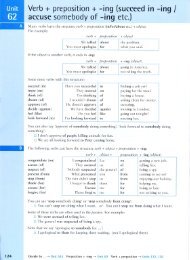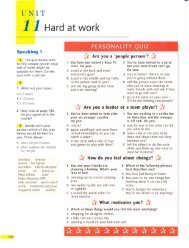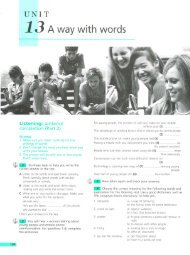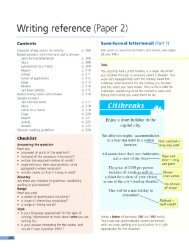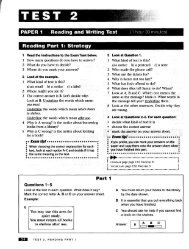You also want an ePaper? Increase the reach of your titles
YUMPU automatically turns print PDFs into web optimized ePapers that Google loves.
-.1"<br />
T]<strong>NIT</strong><br />
6 lt's your call<br />
Vocabulary 1 : technology<br />
1 Put the following words into the correct<br />
category below. Some words may go in more<br />
than one category. Can you add any more words<br />
battery cable C D cursor email<br />
engaged tone file film focus handset<br />
hard drive keyboard keypad line monitor<br />
mouse negative plug ring tone screen<br />
scanner text message zoom lens<br />
Computer Camera Telephone<br />
battery<br />
battery<br />
2<br />
1 Complete the sentences using words<br />
from Exercise 1. You will need to make<br />
some words plural.<br />
1 Do you keep the Lg!!Y.*. of your<br />
photographs so you can get copies made<br />
if you want to<br />
2 How often do you have to recharge the<br />
in your mobile phone<br />
3 How many fingers do you use when you<br />
type on a computer ...........<br />
4 Does your camera have a ........... which<br />
allows you to take close-ups<br />
5 ls the on a computer screen a<br />
flashing line or an arrow<br />
6 Do you use a........... to save photographs<br />
and other documents onto your<br />
computer<br />
7 What kind of have you got on<br />
your mobile phone<br />
10<br />
Have you ever had a problem when you<br />
sent a ........... to be developed (e.9. the<br />
shop lost it)<br />
Do you get a headache if you look at a<br />
for a long time<br />
computer<br />
Which finger do you use when you press<br />
the numbers on a telehone . . . . <br />
2 Now discuss the answers to the<br />
questions with a partner.<br />
Exampfe: I don't need to keep the negatives<br />
any more because I have a digital camera.<br />
3 Discuss.<br />
What benefits have the camera, the phone and the<br />
computer brought to everyday life<br />
Listening 1: multiple matching<br />
(Part 3)<br />
1 Look at the photos.<br />
1 What is happening in each one<br />
2 How do you think the people are feeling<br />
.f<br />
t,
t-<br />
I<br />
o<br />
u,/<br />
2 You will hear five people talking about<br />
photography and the media.<br />
1 Choose from the list A-F which opinion each<br />
speaker expresses. Use the letters only once.<br />
There is one extra letter which you do not<br />
need to use.<br />
A Modern developments in photography may affect<br />
the privacy of ordinary people.<br />
B Photographs don't always reflect the truth.<br />
C Modern technology means ordinary people can<br />
compete with professional journalists.<br />
D Media attention is justifiable in certain situations.<br />
E Technology helps me to take more natural<br />
photographs.<br />
F I was upset when pictures were taken of me<br />
without my agreement.<br />
['<strong>NIT</strong> (r lt's your call<br />
Use of English 1: word formation<br />
(Part 3)<br />
1 Read the title and the text below. Does the<br />
writer want to be famous or not<br />
2 Use the word given in capitals below the<br />
text to form a word that fits in the gap in each<br />
line. There is an example at the beginning (0).<br />
TIP! Remember to check if nouns need a<br />
negative pref ix and/or a plural ending.<br />
WOULD YOU LIKE TO BE FAMOUS<br />
Most people find the idea of fame (0) q.r.!.nf.l!yg. . Aut<br />
would you (1) want to be famous The people<br />
who dream of fame don't always realise just how<br />
Speaker 1 f-l-il-l<br />
many (2) there are for those who spend their<br />
Speaker 2 a-f71<br />
lives in the public eye. They see the (3) ........... things<br />
Speaker 3<br />
about being a star, and the<br />
[-Ttl<br />
(a) benefits that<br />
fame brings, but they tgnore the problems that go<br />
Speaker 4 a-f4-l<br />
along with it.<br />
Speaker s Ttl<br />
Famous people have (5) around them<br />
2 Listen again to confirm your ideas.<br />
wherever they go, pointing cameras in their faces.<br />
They may have to put up with (6) writing<br />
3 Match the highlighted phrases to their<br />
things about them in the newspapers that are<br />
meanings below. You heard all these phrases in (7) untrue. With this kind of pressure, some<br />
the recording.<br />
celebrities don't find it easy to keep up (8) ...........<br />
with friends, and they may even regret making the<br />
1 they'd kill or be killed f )<br />
(9) to seek fame. lt's certainly true that once<br />
2 filming on location<br />
you've become well-known you can't go back to an<br />
3 the whole face of news reporting<br />
ordinary life. So is fame actually worth it lts a<br />
4 a breaking news story<br />
(10) choice, but I know that I would hate it.<br />
5 the celebrity promotion machine<br />
6 they'll do the rounds of<br />
O ATTRACT<br />
7 they've all been touched up<br />
1 ACTUAL<br />
2 ADVANTAGE<br />
a) altered and made to look better<br />
3 ENJOY<br />
b) organised publicity for famous people<br />
4 FINANCE<br />
c) information that is just beginning to arrtve<br />
5 PHOTOGRAPH<br />
d) go to several different places in successton<br />
6 JOURNAL<br />
e) out of the studio<br />
7 COMPLETE<br />
f) risk danger and cause danger to others<br />
8 RELATE<br />
g) the way something appears to people<br />
9 DECIDE<br />
1O PERSON<br />
4 Do you agree with the following<br />
statements WhyAl/hy not<br />
. The camera never lies.<br />
. Celebrities shouldn't expect to have privacy.<br />
3 Would you like to be famous, even just for a<br />
short time Discuss what might be good and bad<br />
about it.<br />
I<br />
69
LT{IT 6 lt's your call<br />
70<br />
Grammar 1: certainty and<br />
possibility<br />
Present<br />
1 Underline the modal verbs in the following<br />
sentences, and match them with the descriptions<br />
below.<br />
1 Look at this photo I took - I think I might be able<br />
to sell it to the newspapers.<br />
2 She must be very pleased with the wedding photos<br />
- they've come out really well.<br />
3 The President may be giving a press conference<br />
later today.<br />
4 I suppose the reports could be true, but I doubt it.<br />
5 That can't be Nicole Kidman, can it She looks<br />
completely different.<br />
a) lt's certainly true.<br />
b) lt's certainly not true.<br />
c) lts quite likely to be true.<br />
d) lts possible that its true.<br />
Grammar reference p.200 (a.2-3)<br />
2 Complete the sentences wilh must, may,<br />
might, could or can't and a suitable verb from the Q z lirt"n and check your answers.<br />
box in the correct form. Use each main verb only '*<br />
once.<br />
come be explain stay feel find<br />
remember tel+ be able to<br />
Exampte: sne 9.1.4.P..!.t.t.i19. the truth - its hard to<br />
say<br />
1 Simone says she .. to the party, but<br />
she's not sure.<br />
2 l'm afraid I can't help, but maybe my brother<br />
.. the answer to you.<br />
3 My grandparents .. with us next week<br />
- they'll let us know by Friday.<br />
4 You .. Carrie, surely She used to be in<br />
our class.<br />
5 You .. serious -<br />
to leave, are you<br />
6 L.................... finish the report by Friday - l'll do<br />
my best.<br />
you're not really going<br />
She..................... nervous, having to give a<br />
presentation to so many people.<br />
8 You<br />
this book useful for your essay.<br />
3<br />
1 Match each of the following statements with<br />
the best response below.<br />
1 l've won first prize! 4<br />
2 ls it just me, or is it hot in here<br />
3 I wonder if I can get a cheap flight to New York.<br />
4 I find heavy metal music quite relaxing.<br />
5 I think a lot of telephone calls are unnecessary.<br />
6 I feel like going to the cinema.<br />
7 I can't use my new computer because they didn't<br />
install the software.<br />
8 I don't know much about computers.<br />
a) You could try looking on the lnternet.<br />
b) You must be in a minority these days.<br />
c) You may have a point there.<br />
d) You might be coming down with something.<br />
e) Well done! You must be thrilled.<br />
f) You may be able to do it on your own, you know.<br />
g) You must be joking! Really<br />
h) There may be something good on at the Odeon.<br />
3 With a partne; practise the mini-dialogues<br />
using appropriate intonation.<br />
Past<br />
4 Choose the best alternatives in the<br />
following sentences.<br />
1 The photographer must / can't have touched up<br />
that photo - she looks a lot older than that really.<br />
2 He might / can't have meant to upset you when he<br />
said that - he's a very kind man.<br />
3 To take that photo, the reporter couldn't / must<br />
have been hiding in the garden - or maybe he was<br />
even inside the house.<br />
4 I don't think I could I mighthave done what<br />
Mother Teresa did - she was a very brave person.<br />
5 He could / must have been mad to climb the tower<br />
without safety equipment.<br />
6 'l wonder where they are' 'They may / can't have<br />
got lost.'<br />
' Grammar reference p.200 (1a.2-3) (<br />
nt
U<strong>NIT</strong> 6 lt's your call<br />
5 Correct the mistakes in the<br />
following sentences.<br />
1 Bruce can't has been chosen for<br />
the job - he doesn't have the right<br />
experience.<br />
2 This photograph is very dark - it<br />
couldn't have being taken outside.<br />
3 Be careful what you say to him -<br />
he can't to be trusted to keep a<br />
secret.<br />
4 The police might have watching<br />
the house.<br />
5 He can't see that she was there, or<br />
he'd have spoken to her.<br />
6 She may have want to come to<br />
the film - why don't you ask her<br />
7 lt wasn't a good idea to phone at<br />
midnight. I might be asleep.<br />
B They may been intending to leave<br />
the country.<br />
9 You can't still doing your<br />
homework!<br />
6 Read this extract from Dave's<br />
CV. Dave does not say what he<br />
was doing from 2002-2004. How<br />
do you think he became Editor of<br />
Hi! Magazine<br />
Example: He might have met<br />
someone famous.<br />
1996 _ 79gg<br />
7999 _ 2002<br />
2OO4<br />
- present<br />
CURRICUI,UM VITAE<br />
Bingly College: Diploma<br />
course in Journalism and<br />
Photography<br />
Reporter/photographer<br />
onCrawley Evening News<br />
(salary f 12.000)<br />
Editor of Hil Magazine<br />
(salary f 100,000)<br />
,:<br />
\,<br />
Listenin g 2= song<br />
1 You are going to hear a song called We are the<br />
Champions. As you listen, think about this question:<br />
What sort of champion do you imagine the singer might be<br />
2 Look at the words of the song and complete the<br />
collocations using words from the box.<br />
calls crime cruise done fortune<br />
made race share taken time<br />
I've paid my dues<br />
Time after (l) ...........<br />
I've (2) my sentence<br />
But committed no (3)<br />
And bad mistakes<br />
I've (4) ........... a few<br />
I've had my (5) of sand kicked in my<br />
But I've come through<br />
Chorus<br />
And we mean to go on and on and on and on<br />
We are the champions my friends<br />
And we'll keep on fighting till the end<br />
We are the champions<br />
We are the champions<br />
No time for losers<br />
'Cause we are the champions - of the world<br />
I've (6)<br />
my bows<br />
And my curtain (7) ...........<br />
You brought me fame and (8) ........... and<br />
everything that goes with it -<br />
I thank you all -<br />
But it's been no bed of roses<br />
No pleasure (9) ...........<br />
I consider it a challenge before<br />
the whole human (10) ...........<br />
That I'd never lose.<br />
Chorus<br />
3 Discuss the following questions about the song.<br />
1 What phrases from the song tell us that the singer had a difficult<br />
time in the past<br />
2 The singer says 'l've made mistakes'. What sort of mistakes<br />
might he have made<br />
3 Who do you think the singer means by you in the third verse<br />
a) friends and family b) the public c) the media<br />
4 How does the singer feel about the people who have brought<br />
him fame<br />
# ,'<br />
71
t\.IT 6 lt's your call<br />
Reading: gapped text (Part 2)<br />
1 Discuss the following questions.<br />
1 Do you have a mobile phone lf so, how long have you had it<br />
How important is it to you<br />
Do you send and receive text messages How often What are<br />
they usually about<br />
What do these messages mean<br />
a) CULBR b) ruOK c)Thx4yrmsg<br />
Check your answers below.<br />
What abbreviations do you use in your own language<br />
2 You are going to read a newspaper article about mobile<br />
phones and email.<br />
Read the title and subheading of the article. How do you<br />
think email and text messaging might be 'changing the way<br />
people relate to each other'<br />
4 Discuss these questions.<br />
1 The article mentions several<br />
advantages of mobile phones and<br />
emails. Can you think of any more<br />
2 Do you agree with Annabelle that<br />
text messaging is encouraging bad<br />
habits of spelling and grammar<br />
What other problems are there<br />
5<br />
1 Match the numbered words and<br />
phrases in the text to the<br />
following meanings.<br />
a) stay in contact<br />
b) a group of people or things that are<br />
connected in some way<br />
c) someone you know indirectly<br />
d) between only two people<br />
e) looking directly at someone<br />
2 Underline three more phrases in<br />
the text (e.9. phrasal verbs and<br />
collocations) that you would like<br />
to remember and use.<br />
'abessaLu rno{ ro1 s)ueql (l<br />
i;9 no{ ary (q<br />
'ra1e1 no{ aa5 (e<br />
Read the first paragraph and compare your ideas.<br />
3 Choose from the sentences A-H the one which best fits<br />
each gap (1-7). There is one extra sentence which you do not<br />
need to use.<br />
72<br />
G<br />
She can send them a message saying 'Hi, thinking of you,'<br />
much more easily than sitting down to write a long letter.<br />
For example, they might write "tomoro" for "tomorroq"'<br />
she says.<br />
This flexibility when making social arrangements means she<br />
no longer has to plan ahead, she says.<br />
But no one ever did before text messaging really started taking<br />
off.<br />
In these situations, she says, it is better to communicate face<br />
to face.<br />
Through such additions, she says, they have the chance to<br />
present themselves to others in the way that they want to.<br />
But in fact, the rapid expansion of electronic communication<br />
in the 21st century has had the opposite effect.<br />
She finds that she feels less nervous that way.
Now we're getting the message<br />
Text messaging and<br />
email are changing the<br />
way people relate<br />
to one another.<br />
Sara Gaines reports<br />
'When computers first started to be<br />
used on a wide scale, some people<br />
predicted that we would spend so<br />
long staring at computer screens<br />
s that we would end up forgetting<br />
how to talk to one another.<br />
1 ............ Rather than<br />
retreating into themselves, people<br />
are using new technology, in<br />
ro particular email and text<br />
messaging, to find more and more<br />
ways to expand theft lnetwork of<br />
friends.<br />
Alice Thompson, 23, is known<br />
rs as the Text Queen to her friends<br />
because she sends out so many<br />
messages. ''Vfhen we go out, my<br />
friends and I text other friends<br />
saying, "'$e're in this club and it's<br />
zoreally good. Come and meet us."'<br />
2 ............ Instead<br />
decisions can be made on the spot,<br />
and friends can be gathered<br />
together at a moment's notice.<br />
2s Alice has found text messaging<br />
has other advantages too. 'If there<br />
is a guy I like, I find it easier to<br />
send text messages initially rather<br />
than phone him up,' she says.<br />
:o 3 .......... 'There is one<br />
Evy,2a friend of a friend, who I<br />
don't know that well, but we've<br />
started to text message each other<br />
and that's how we communicate. I<br />
ss would never have phoned him up<br />
but this way it feels OK.'<br />
Text messaging and email also<br />
help Alice 3keep in towch with old<br />
schoolmates she would probably<br />
+o have lost contact with otherwise.<br />
4 ............ And she finds<br />
it's a great tool for relieving<br />
boredom in the office where she<br />
works, by sharing secret messages<br />
es and passing on jokes.<br />
It seems these forms of<br />
communication have filled a gap,<br />
offering something that aface-toface<br />
conversation does not.<br />
so Professor Pam Briggs, a<br />
psychologist at the University of<br />
Northumbria, believes that people<br />
enjoy sending text messages and<br />
emails because they can take their<br />
ss time planning their message, and<br />
they can be a bit more playful,<br />
inserting jokes, pictures and bits of<br />
video clips. 5 .............<br />
The fact that text messages are<br />
oo so quick and easy is a big part of<br />
the attraction. Many people also<br />
find text messaging more informal<br />
than making a phone call or<br />
writing a letter, and therefore<br />
os simpler to use. Annabelle Rose,<br />
who teaches at a London sixth<br />
form college, encourages her<br />
students to text her when they<br />
have queries. 'They don't find it so<br />
zo difficult to keep in touch that<br />
wag' she says. 'I think they feel<br />
that a phone call might be more of<br />
an interruption. I've always given<br />
my number out to students and<br />
zs told them to call me if they have<br />
any problems. 6 ....................'<br />
So is it all good Annabelle has<br />
identified one negative result of<br />
text messaging. 'My students have<br />
so developed their own way of<br />
writing as well, which can cause a<br />
few difficulties as they have<br />
started using these abbreviations<br />
in their normal writing.<br />
zs7 ......... 'But they are<br />
never rude. If I text them back<br />
answering their queries they<br />
always send another message<br />
saying "Thx", even though it's not<br />
eo really necessary.'<br />
Adapted front THE GUARDIAN 73
Grammar 2= passives (1)<br />
1<br />
1 When did the events below happen Write the<br />
correct year in each gap.<br />
1992 1876 1971 1844 1975 189s<br />
1 The first telegram was delivered in ...........; today,<br />
telegrams have been replaced by email.<br />
2 The first phone callwas made in ..........., and<br />
phone calls are still being made every day across<br />
the world - but today the majority are made by<br />
mobile phone.<br />
3 The first words transmitted by wireless could be<br />
heard in<br />
- and who knows - maybe<br />
transmissions will be received from other planets in<br />
the future!<br />
4 The first personal computer was launched in<br />
and once they had been developed, they<br />
changed the way we work.<br />
5 Millions of email messages are now sent and<br />
received every day, but the first one was sent in<br />
6 Millions of text messages have also been sent since<br />
the first one in<br />
2 Underline the passive verbs in the sentences<br />
above.<br />
2 Choose the correct alternative in each of the<br />
following sentences.<br />
Students are / are berng allowed to use the<br />
computers rn the library as often as they want.<br />
Employers regularly monitor the emails that are /<br />
have been sent by their employees.<br />
I hope that the new building is being / will be<br />
finished next year.<br />
4 How long did it take for the film Ihe Matrix<br />
to be /being made<br />
5 As we walked down the road, we realised we haye<br />
been / were being followed.<br />
6 That homework should have been / should be finished<br />
by the end of last week.<br />
7 They say mobile phone bills are going to be / have<br />
been cut by 5oh very soon.<br />
8 We didn't realise he'd given / been given a promotion.<br />
F" Grammar reference p.202 (17)<br />
3<br />
1 Read the following advert. What is special<br />
about the iCEBOX<br />
Slaving in the kitchen will<br />
never be the same again,<br />
thanks to the iCEBOX,<br />
an lnternet-enabled<br />
entertainment centre<br />
that fits under your<br />
kitchen cupboard.<br />
Flip open its colour LCD monitor and<br />
you'll be able to send emails to your friends or surf the web<br />
using the touch-sensitive screen. You can also use the<br />
|CEB0X to watch W and DVDs and listen to CDs and the<br />
radio. |CEB0X comes with a wireless keyboard, which is<br />
washable to deal with those inevitable kitchen spills.<br />
2 The following report gives the same<br />
information as the advert above, but the<br />
language is more formal. Complete the text<br />
using passive forms of the verbs in brackets.<br />
74
[ \lT (r lt's your call<br />
,1 1 1<br />
2<br />
Makers of the iCEBOX claim that working in the<br />
kitchen rvill be much r<br />
oevice rrr l:..::- ::l:,LTli,o;illce<br />
this new<br />
The iCEBOX is an Inr<br />
centre that (2 ) ............."tnet-enabled entertainment<br />
1nav/fir)<br />
cupboard. under a The<br />
kitchen<br />
device r;;<br />
at first but rvhen ,rr. ."r"r, r_c<br />
-"- ..,. Icottcettl)<br />
,"1-^^: ,,<br />
......... (ltip opett). itreveals a rouch_sensitive<br />
screen. allorving the usr<br />
The iCEBOi-e.,..,s ur€r to send ernails or surf the web.<br />
Lu ryl"ij,';; ,;;;;; to watch<br />
;; C";^f;i,l{::oo/L,se)<br />
The iCEBOX (6) .........<br />
w<br />
irr e :_$ kt;";.,; ; ; ; ; r ; ;;", Jfi,lJ,,illi,"lr, 1,,.n."<br />
spills (7)<br />
The makers craim that o(carr/daal<br />
v'ith) eas,y.<br />
icEBox i;i : .: ::::l:ii,'Jlii,::;:;;,,1;,, ^<br />
4<br />
Complete the responses using the verbs in<br />
brackets in the correct form. Then listen to<br />
check.<br />
A: I want to learn French.<br />
B: Why Spanish .. (speak) by a lot<br />
more people.<br />
A: Whats Ken planning to do when he finishes his<br />
course<br />
B: Well, I think he ....................... (offel a lob with a<br />
telesales company.<br />
A: l've got backache. I think I need to see a<br />
specialist.<br />
B: Can't it ....................... (treat) by your ordinary<br />
doctor<br />
A: I think that Marlowe wrote Hamlet.<br />
B: Oh no - l'm sure it ....................... (write) by<br />
Shakespeare.<br />
A: That building looks really dangerous.<br />
B: Yes - it'll ....................... (have to/pulldown) soon<br />
A: I think that bad weather causes a lot of<br />
accidents.<br />
B: Well, I think more ........... (cause) by<br />
dangerous driving.<br />
A: Did you go to the party on Saturday<br />
B: No, I .. (invite).<br />
Use of English 2: open cloze<br />
(Part 2)<br />
1 Look at the title of the text and the photo.<br />
1 What do you think happened to Dave Mill<br />
2 What part do you think the mobile phone might<br />
have played in the story<br />
2 Read the text to see if you were right.<br />
3 Read the text again and think of the word<br />
which best fits each gap. Use only one word in each<br />
gap. There is an example at the beginning (0).<br />
All thanls t0 iltc<br />
mobile [none<br />
Dave Mill owes his life<br />
(0) ...fra.... his mobile phone. He rvas<br />
trying to make history by walking to<br />
the North Pole alone, without any<br />
help or support. But after 50 days of<br />
extremely bad weather, during<br />
(1) ........... the temperature dropped<br />
(2) ....... ... low as minus 30'C, Dave<br />
(3) . . . . . forced to abandon his attempt.<br />
He had completed 185 miles of the 375-mile<br />
journey and had suffered several mishaps. He had<br />
broken his sunglasses, (4) ........... followed by polar<br />
bears and fallen into freezing water twice. Then, after<br />
(5) ... . . . the decision to give up, he had some more<br />
bad luck and found (6) . . . stranded on a floating<br />
piece of ice that was slowly melting.<br />
The weather was too bad for any rescue attempt to<br />
(7) ........... made. Dave rvaited (8) ..... . .. three days,<br />
hoping that conditions would improve. But the rescue<br />
planes could not land because dense fog prevented<br />
(9) . . .. . . from seeing the surface of the ice.<br />
Then he remembered his mobile phone. He marked<br />
out a runway on the ice and (10)<br />
a photograph<br />
with his digital camera. Then he used his phone to<br />
email (11) to the waiting air rescue team. Using<br />
the photograph to guide him, the pilot was able to land<br />
in (12) of the weather, and Dave rvas lifted off<br />
the ice to safety.<br />
2<br />
1<br />
2<br />
3<br />
4<br />
Answer these questions using a passive form.<br />
Why is it useful to learn English<br />
Was it Renee Zellweger who played the part of<br />
Rose in Titanic<br />
What do you think causes accidents on the roads<br />
Whats your favourite book and who wrote it<br />
4 Discuss these questions.<br />
Do you think that people should try to undertake<br />
this kind of expedition WhyA//hy not<br />
Can you give any other examples of people whose<br />
lives have been saved by technology<br />
75
L'NlT (r lts your call<br />
76<br />
Vocabulary 2: communicating<br />
with others<br />
1<br />
1 Complete the sets of sentences using a verb<br />
from the box in the correct form. Which verb<br />
f its all the sentences in each set<br />
say speak talk tell<br />
1 a) l've never........... a lie in my life.<br />
b) ldon't believe in........... tales.<br />
c) You should always the truth, no matter<br />
how much it hurts.<br />
d) l'm good at ........... jokes.<br />
2 a) I don't<br />
learn.<br />
.... a word of German. but l'd like to<br />
b) My teacher sometimes so quickly that I<br />
can't understand a word he says.<br />
c) If I get bad service in a shop, I always ask to<br />
to the manager.<br />
d) I like people who aren't afraid to ........... their<br />
mind.<br />
3 a) I ........... to my friend on the phone every day.<br />
b) I enjoy politics with my friends.<br />
c) My boy/girlfriend and 1have........... about<br />
getting married.<br />
4 a) l'm always things I shouldn't.<br />
b) Everyone I would be a good manager.<br />
c) I can't I enjoy learning English.<br />
2 Read the sentences again, and say which are<br />
true for you. Explain your answers.<br />
2 Complete the following dialogues with an<br />
appropriate preposition.<br />
1 A. l'm so sorry you're leaving.<br />
B: Me too - but we'll keep ........... touch.<br />
A: l'm calling to check on my pizza order - it hasn't<br />
been delivered yet.<br />
B: l'm sorry - did you order ........... phone or<br />
person <br />
A: Can I contact you ........... email<br />
B: Yes, of course - l'll give you my email address.<br />
A: Steven's missed a lot of classes lately.<br />
B: Has he Maybe we should have a word<br />
him.<br />
A: How did you two get to know one another<br />
B: Actually, we met a friend.<br />
A: Have you known each other long<br />
B: Yes, we've been going out one another<br />
for a year.<br />
3 Work with a partner. Look at the<br />
highlighted phrases in the following sentences,<br />
and decide what they mean. Then write four<br />
short dialogues, ending with the sentence given.<br />
1 OK, l'll send them by post.<br />
2 Could you put that in writing, please<br />
3 No, I found out about it by word of mouth.<br />
4 You can get more details on their website.<br />
5 lts in the post.<br />
Example:<br />
A: l'll email you the details, shall l<br />
B. I don't have email.<br />
A. OK, l'll send them by post.<br />
4 Complete the second sentence so that it has<br />
a similar meaning to the first sentence, using the<br />
word given. Do not change the word given. You<br />
must use between two and five words, including<br />
the word given.<br />
I asked if I could talk to Sophie.<br />
word<br />
I asked if I could<br />
Sophie.<br />
l've got to present the project to the Board of<br />
Directors tomorrow.<br />
presentation<br />
l've got to ............... about the project to<br />
the Board of Directors tomorrow.<br />
We were able to find a solution to the problem<br />
that we could both accept.<br />
compromise<br />
We were able ............<br />
problem.<br />
over the<br />
I wasn't ready for the test because I hadn't done<br />
enough work.<br />
preparation<br />
I hadn't<br />
for the test.<br />
I really enjoy meeting friends and talking to them<br />
over coffee.<br />
chat<br />
I really enjoy meeting friends and<br />
them over coffee.<br />
I think we should talk about this with the boss.<br />
discussion<br />
I think we should ....... this with the boss.
t\IT 6 lt's your call<br />
Exam focus<br />
Paper 5 Speaking: long turn (Part 2)<br />
About the exam: ln Part 2 of the Speaking test,<br />
you speak on your own for about a minute. The<br />
interlocutor gives you two photographs on the<br />
same topic. He tells you the topic and what to<br />
talk about. The task has two parts: you have to<br />
compare the photos and give a personal reaction<br />
to them.<br />
The other candidate is then asked a question<br />
related to the topic and has to give a short<br />
answer (about 20 seconds).<br />
Then you change roles.<br />
Procedure<br />
1 Listen carefully to the instructions, especially<br />
the second part. Ask the interlocutor to repeat<br />
the instructions if you are not sure what to do.<br />
2 First, describe the main thing the two photos<br />
have in common and the main difference, and<br />
then describe more similarities and differences<br />
(about 40 seconds).<br />
3 Leave yourself enough time for the second<br />
part of the task (about 20 seconds).<br />
4 lf you have some time left, relate the photos<br />
to your own experience.<br />
5 While the other candidate is speaking, look at<br />
their photos and listen carefully, but don't say<br />
anything. When he/she has finished, be ready<br />
to answer the interlocutor's question.<br />
1 Look at photos A and B. What is the main<br />
thing they have in common<br />
2 You will hear two candidates doing a Part 2<br />
Listening task.<br />
t : ) t First. listen to the interlocutor's instructions.<br />
\L/<br />
- What does he tell Candidate A to do<br />
@<br />
Z ruo* listen to the two candidates doing the<br />
task.<br />
1 Does the first candidate follow the interlocutor's<br />
instructions<br />
2 Does she do both parts of the task<br />
3 Does the second candidate answer the question<br />
correctly<br />
3 Work in groups of three. You are going to<br />
role-play Part 2 of the exam.<br />
Student A: You are the interlocutor. Look at the<br />
instructions on page 182 and tell the two<br />
candidates what to do.<br />
Students B and C: You are the candidates.<br />
Student B look at photos C and D on page 184.<br />
Student C look at photos E and F on page 186.<br />
4 When you have finished, discuss the task<br />
together.<br />
Student A<br />
1 Did the candidates do both parts of the task<br />
2 Did they manage to keep talking for one minute<br />
3 What were the good points about their talk<br />
Students B and C<br />
1 What do you think you did well<br />
2 What did you find more difficult
['<strong>NIT</strong> (r lt's your call<br />
Writing: report (Part 2)<br />
About the exam: ln Part 2 of Paper 2, you may be<br />
asked to write a report. When writing a report:<br />
r you should use formal English<br />
r !ou should give your report a title<br />
. you should have an introduction giving the<br />
background to your report<br />
. you can use headings and numbered points<br />
. you may include recommendations at the end.<br />
DON'T begin and end like a letter.<br />
1<br />
1 Read the following report, which was written<br />
by a teacher for the Head of a Language<br />
School. Does the teacher think that mobile<br />
phones are a good thing or a bad thing<br />
USE OF MOBILE PHONES IN CLASS<br />
lNrnooucrtoN<br />
This report describes problems caused by the use of<br />
*"oti.'on""ts by tonttffi students' and makes<br />
recommendation' their use tl t^tnoot<br />
I'l:<br />
The information torn"' l'oniinteruiews<br />
with class<br />
;#;;t ;;d administrative staff'<br />
Pnogl-BI\4s<br />
I There is a rule that sudents should turn off their<br />
' il;;;;1,,"9'."'"'g<br />
students either torg' :ffi,1;lill'.T,11'r*,,<br />
;'ilffi;;;'ing iu'ing class time *1:1:<br />
intemrpts the class and-disturbs other students'<br />
. e^ne vortnse6t"d;;; use their phones to send<br />
' #;ile' o' Pruv gaTe.s ouline c]1]l;<br />
iwehavenua*unyi.fiuinttfromparentsand<br />
' il#;;,'* *ouit" phones have been lost or<br />
stolen in the school'<br />
RecotvttlleNoertONs<br />
Because of these problems' we recommend<br />
that no<br />
;;fi;J;;il u'uno*"a to bring a m3!1r;'rhone to<br />
school. There are several public.phone:<br />
:-:n"<br />
school, which studeni' lun ut" if necessarY'-Ihese<br />
,il"tiiu" t"gularly checked to ensure they are tn<br />
good working order'<br />
2 Answer these questions about the report.<br />
ln the introduction, the writer summarises what the<br />
report is about. What else does it mention<br />
What recommendations does the writer make at<br />
the end What modal verbs are used<br />
2<br />
1 Think of some reasons why students might<br />
want or need to bring their mobile phones to<br />
school. Make a list.<br />
Example:<br />
Students might need to phone home if they have<br />
transport problems.<br />
2 Think of some ways in which the problems<br />
described in the teacher's report could be<br />
solved. Make a list.<br />
Example:<br />
Students should check that phones are switched off<br />
before c/asses start.<br />
3<br />
1 Read this task and underline key words.<br />
You are a student at a language school. Teachers<br />
have complained about the use of mobile phones<br />
by students in class. As a result, the Director of<br />
the school wants to ban them completely.<br />
Write a report for the Director, explaining why<br />
mobile phones are necessary for students and<br />
recommending ways in which their use could be<br />
controlled.<br />
Write your report in 120-180 words.<br />
2 This report should have three sections. Plan the<br />
main points you will make in the second and<br />
third sections.<br />
4 Now write your report. The introduction has<br />
been started for you. Then check your work.<br />
Introduction<br />
lhis report explalns why mobile phones are<br />
important for students, and makes<br />
recommendations about their use in the<br />
school. lhe lnformation comes from ...<br />
78<br />
Writing reference pp. 206, 210
uNIr<br />
6 Review<br />
1 3 Someone must have seen him therel<br />
been<br />
1 Complete the following sentences, using the<br />
He .............. there by someone!<br />
correct form of the word in capitals' 4 Their normar business was continued after a short<br />
1 Peter thinks that a lot of about the future break.<br />
may be wrong. PREDICT<br />
on<br />
2 Janet says that text messages have made .......... After a short break, they .............................. their<br />
between friends easier. COMMUNICATE normal business.<br />
3 Maria feels that people have too many telephone 5 She may contact him by phone this afternoon.<br />
on personal matters in public. CONVERSE that<br />
4 Ron told me that one of the .......... of text lt ................ she will contact him by<br />
messaging is its cheapness. ATTRACT<br />
phone this afternoon.<br />
5 Sarah explains that text messages use .......... to 6 There's no chance that Peter was in the house at<br />
save time and space. ABBREVIATE<br />
the time.<br />
6 Jose complains that a phone call can be an .......... have<br />
if you are working. INTERRUPT Peter .......... . in the house at the time.<br />
2 Which of the people above do you think want 4 Respond to the following statements, using<br />
to a) save money b) work hard c) make more<br />
friends<br />
may, might, can't, must (have) + verb.<br />
Examples: I can hear the front door bell ringing.<br />
2 what do you think these text messages lt might be the postman'<br />
mean Say them aloud, then write them a1<br />
complete sentences.<br />
I I tuRN 2 CU 20BY!<br />
2 TRTK 2U T8B<br />
Your friend must have come to see you.<br />
1 Lucy hasn't written to me for ages - l'm quite<br />
worried about her.<br />
2 l've got a splitting headache and I keep going hot<br />
and cold.<br />
3 l've just heard that Peter failed his entrance exam.<br />
He was top of the class!<br />
4 Have you seen my keys I can't find them<br />
3 LUV U anywhere.<br />
5 My mobile phone has stopped working.<br />
4 cRN u uB 4 l4E 5 choose the correct arternative in each of<br />
these sentences.<br />
5 THT ME 84 u G0 1 I made the order with / by phone.<br />
2 ln / On his letter, he told me he missed me.<br />
3 Complete the second sentence so that it has 3 Can I contact you by / on email<br />
a similar meaning to the first sentence, using no<br />
4 He's constantly at /on the move.<br />
5 All by / in all, it was an enjoyable experience.<br />
could I have a quick word to / with you<br />
more than five words, including the word given.<br />
1 They advertised the mobile phone so intensively 9<br />
that it was an immediate success.<br />
7 lf you're worried, we can talk it over / about<br />
was<br />
tomorrow.<br />
Because it ................ the mobile phone 8 We arrived at the station just rn / with Iime.<br />
was an immediate success.<br />
9 I found iI from / on the lnternet.<br />
2 The technician solved the computer problem 1 0 You have to speak to him in / on person - you<br />
quickly.<br />
dealt<br />
The computer problem<br />
technician.<br />
........... the<br />
can't phone.<br />
Go to www.iTests.com or your CD-ROM for interactive exam practice. 79


![T]NIT .f](https://img.yumpu.com/33218855/1/500x640/tnit-f.jpg)
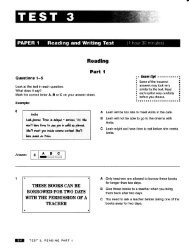
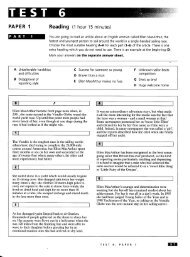
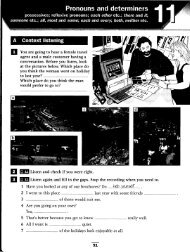
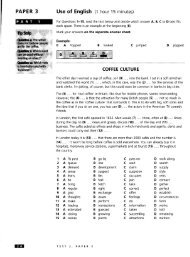
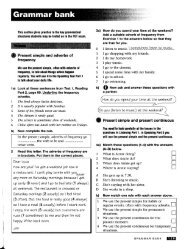
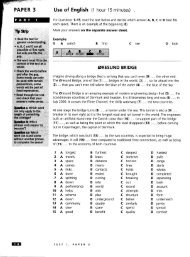
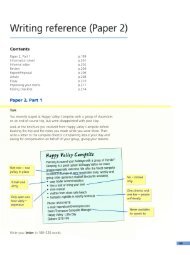

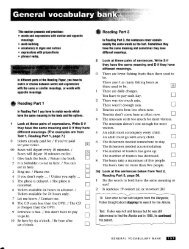
![T]NIT 9 A new look](https://img.yumpu.com/40125756/1/190x248/tnit-9-a-new-look.jpg?quality=85)
